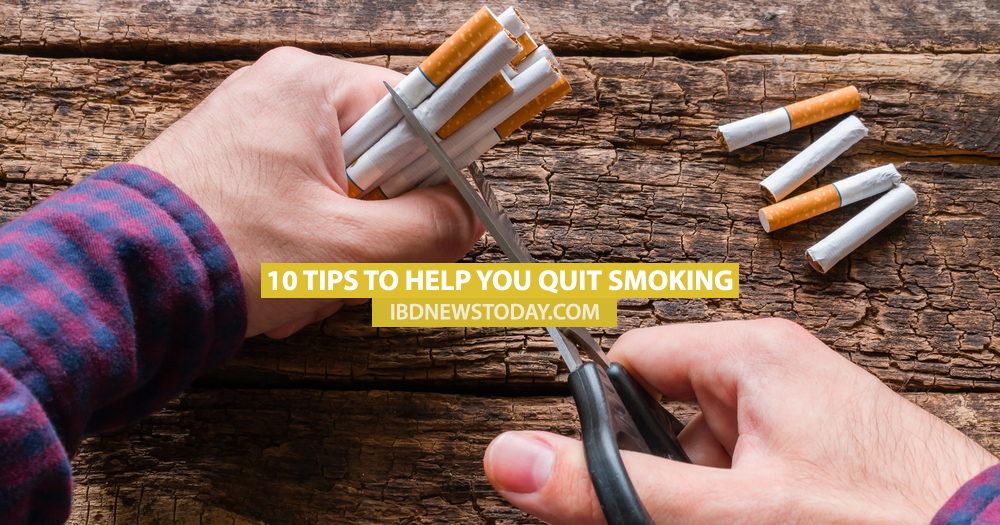Many studies have shown that people who smoke are more likely to develop Crohn’s Disease, and research suggests that smoking increases the severity of the disease. So if you are a smoker and live with IBD, you might want to consider quitting.
Quitting smoking is the single best thing you can do for your health, but it’s not easy to do. In fact, it’s probably one of the most difficult habits to break, which is why we’ve put together this list of tips based on information from WebMD, the American Lung Association and the American Cancer Society.
Get started and begin the rest of your life as a non-smoker.
Pick a Day
Pick a day in the not-too-distant future to be the day you quit smoking. Decide if it’s better to begin your quitting journey on a weekday or on the weekend, ensure it doesn’t clash with any social events or stressful occasions where you may be tempted to smoke.
The Day Before
Tell people that tomorrow is the day you stop smoking. Most people will be supportive of your decision (even other smokers) and will help you through the first few days. Go shopping and buy healthy food like fruits and nuts to snack on, buy chewing gum and if you want, nicotine replacement products such as patches or gum.
The Night Before
The night before your quitting day, smoke your last cigarette and cut up any remaining cigarettes and throw them away. If you have loose tobacco, soak it in water and then throw it away. Also, throw away all ashtrays, cigarette papers, lighters, and matches. Remove the trash from your house and go to bed.
Discover 14 invisible illness you may not have heard of.
The First Week
Avoid smoking triggers such as after-work drinks with colleagues or the first cup of coffee in the morning. If you usually take a break to have a cigarette at certain times of the day, use this time to do something else—phone a friend, read a chapter of a book, check your Facebook…anything to take your mind off smoking. You can try chewing a piece of gum, brushing your teeth, or going for a walk after meals.
Exercise
Not only will this help fight the often inevitable weight gain that comes with quitting smoking, but it’ll serve as a useful distraction. Consider giving your body a two-for-one deal in terms of health benefits.
Snack Healthily
You will probably eat more once you stop smoking, since the hand-to-mouth habit is almost as tough to break as the nicotine addiction. Don’t undo your good work by snacking on unhealthy processed food that will probably make you gain weight. Fill your refrigerator with healthy snacks like fruits, vegetables, and nuts, and drink plenty of water.
Find out more about how Crohn’s disease affects intimacy.
Save Your Money
Put the money you would have spent on cigarettes in a jar. You’ll be amazed at quickly this builds up and plan to buy yourself something nice with the money you save. There are also apps that can help you keep track of how much money you’ve saved since you quit smoking.
Keep Busy
Those first few weeks will be tough so try to keep as busy as possible so you don’t have too much time to sit around thinking about smoking. Try to do things that aren’t part of your normal routine. Hang around with non-smoking buddies and try to spend time in environments where you can’t smoke, even if you wanted to.
If You Fail, Try Again
You may buckle and give in and find yourself stealing a drag or two of a friend’s cigarette, or maybe smoking a whole one. Don’t despair, it’s just a slight setback. Remind yourself why you want to stop smoking and continue on with the plan.
Ask for Help
If you are really struggling to kick the habit, ask your doctor about prescription drugs that can help you quit. Consider complementary medicines such as acupuncture and hypnosis.
Read our six tips for loving your body with inflammatory bowel disease.
IBD News Today is strictly a news and information website about the disease. It does not provide medical advice, diagnosis or treatment. This content is not intended to be a substitute for professional medical advice, diagnosis, or treatment. Always seek the advice of your physician or another qualified health provider with any questions you may have regarding a medical condition. Never disregard professional medical advice or delay in seeking it because of something you have read on this website.

